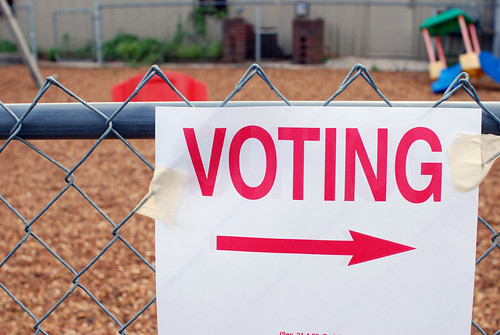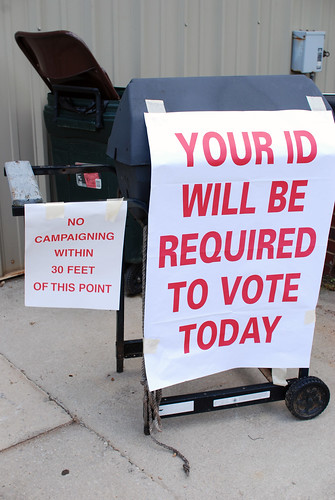Secret, opinionated society
Way #6 you know you're a public servant: you vote in primary races, and recognize the names on the smaller races, because they're the people that fund the organization you work for.
As a child, there was a mystique about voting, since I didn't go inside when my parents voted. Voting was a secret rite of passage into adulthood, like buying car tags or knowing what engine part needed replacing even without checking under the hood. For years I wondered what happened behind those doors, and when finally inducted into that secret, opinionated society, I was a little disappointed at how simple and mundane it really was.
 Voting this way
Voting this way
[photo: sign outside voting area]
My precinct votes in the gymnasium of a large church. On primary days you can practically park within an arm's-span of the door, walk right in, grab your ballot and be out within five minutes. It is far more congested when the presidency is involved; those election lines sometimes take up to an hour to work your way through.
Yesterday's election held small races only, so the line was nonexistent.
 No campaigning within 30 feet of this point.
No campaigning within 30 feet of this point.
[photo: signs outside voting area]
I asked the manager of my polling place if it was possible to do photography around the polling area. He, and several of the pollsters, were curious to know why I wanted to take pictures of what seemed (to them) to be an ordinary event.
I looked around at everything in the room -- the stacks of voter names, the Dixie cups plastered with "I Voted" stickers, the vote-tabulation machine, and the portable voter-privacy screens, and the part of me that remembered the mystique of the 'secret society' said, "Because we see things here that we don't see anywhere else."
It turns out that photography isn't legal in voting areas, only outside in public areas. Alabama, as much of the South, still has many Jim Crow days to apologize for. Cameras aren't allowed due to the possibility of voter intimidation. I expected that to be the case, but was disappointed nevertheless. The point of photography is to find celebration in not just the extraordinary, but the commonplace -- and what should be more commonplace yet inspiring than the idea of citizens voting?
Oh well. Use your imagination.
